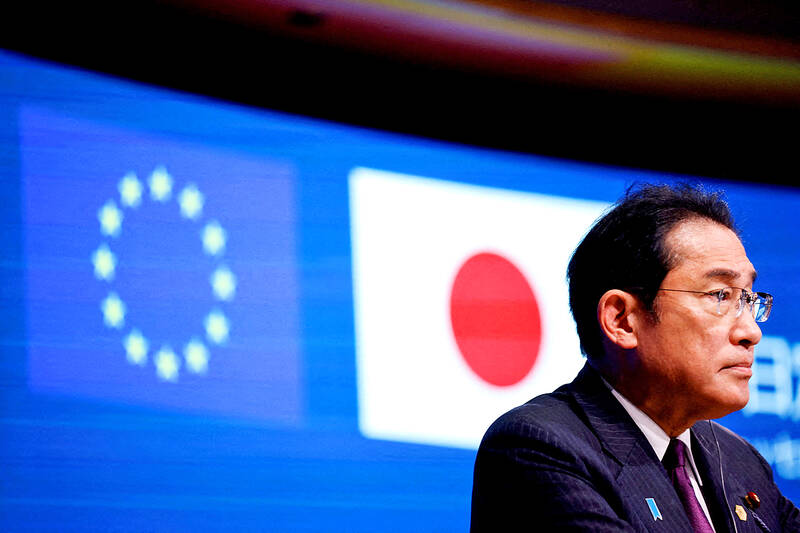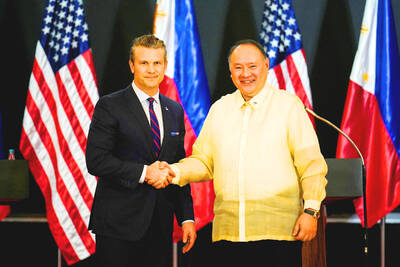Russia’s deepening military cooperation with North Korea has underlined the need for Japan to forge closer ties with NATO as regional security threats become increasingly intertwined, Japanese Prime Minister Fumio Kishida told Reuters.
In written remarks ahead of his attendance at a NATO summit in Washington this week, Kishida also signaled concern over Beijing’s alleged role in aiding Moscow’s two-year-old war in Ukraine, although he did not name China.
“The securities of the Euro-Atlantic and the Indo-Pacific are inseparable, and Russia’s aggression against Ukraine and its deepened military cooperation with North Korea are strong reminders of that,” Kishida said.

Photo: Reuters file photo
“Japan is determined to strengthen its cooperation with NATO and its partners,” he added.
The world should not tolerate attempts by some countries to disrupt the established international order and reiterated a warning that Ukraine today could be East Asia tomorrow, the Japanese leader said.
He also urged cooperation to confront new security threats that transcend geographical boundaries, such as cyberattacks and conflicts in space.
South Korea, Australia and New Zealand, which along with Japan are known as the Indo-Pacific Four, are also attending the meeting with NATO leaders from today to Friday.
South Korean President Yoon Suk-yeol told Reuters this week that he planned to discuss the threat Pyongyang poses to Europe by deepening its Russia ties.
North Korean leader Kim Jong-un last month signed a mutual defense pledge with Russia during President Valdimir Putin’s first visit to Pyongyang in 24 years, and expressed his “full support” for Moscow’s war in Ukraine.
The US and its allies have accused Pyongyang of providing ballistic missiles and artillery shells that Russia has used in its war in Ukraine and say they fear Moscow could provide support for North Korea’s nuclear missile development.
Washington has also said China is supplying drone and missile technology, satellite imagery and machine tools to Russia, items which fall short of lethal assistance, but are helping Moscow build its military to sustain the Ukraine war.
Beijing has said it has not provided any weaponry to any party.
Without naming China, Kishida said “some countries” have allegedly transferred dual-use civilian-military goods to Russia which has served “as a lifeline” for its Ukraine war.
“It is necessary to grapple with such situations in a multifaceted and strategic manner, taking a panoramic view that considers the full range of international actors fueling Russia’s attempt to change the status quo by force,” he said.
“The geographical boundary of ‘Euro-Atlantic’ or ‘Indo-Pacific’ is no longer relevant in safeguarding global peace and security. Japan and Indo-Pacific partners can play a great role for NATO allies from this perspective,” he said.
Constrained by decades of pacifism, Tokyo has been reluctant to supply lethal aid to Ukraine.
However, it has provided financial aid to Kyiv, spearheaded efforts to prepare for its post-war reconstruction, and contributed to NATO’s fund to provide Ukraine with non-lethal equipment such as anti-drone detection systems.
Tokyo has also repeatedly warned about the risks of a similar conflict emerging in East Asia, where China has been taking an increasingly muscular stance towards its territorial claims, including democratic Taiwan.
“This summit is a critical opportunity for Japan, the US and the other NATO allies to confront the ongoing challenges against the international order and to reaffirm values and principles that have shaped global peace and prosperity,” he said.
However, there might be limits over how far NATO members are prepared to go in forging closer ties in Asia. A plan that surfaced last year for NATO to open a liaison office in Japan, its first in Asia, was blocked by France and criticized by China.

‘EYE FOR AN EYE’: Two of the men were shot by a male relative of the victims, whose families turned down the opportunity to offer them amnesty, the Supreme Court said Four men were yesterday publicly executed in Afghanistan, the Supreme Court said, the highest number of executions to be carried out in one day since the Taliban’s return to power. The executions in three separate provinces brought to 10 the number of men publicly put to death since 2021, according to an Agence France-Presse tally. Public executions were common during the Taliban’s first rule from 1996 to 2001, with most of them carried out publicly in sports stadiums. Two men were shot around six or seven times by a male relative of the victims in front of spectators in Qala-i-Naw, the center

Incumbent Ecuadoran President Daniel Noboa on Sunday claimed a runaway victory in the nation’s presidential election, after voters endorsed the young leader’s “iron fist” approach to rampant cartel violence. With more than 90 percent of the votes counted, the National Election Council said Noboa had an unassailable 12-point lead over his leftist rival Luisa Gonzalez. Official results showed Noboa with 56 percent of the vote, against Gonzalez’s 44 percent — a far bigger winning margin than expected after a virtual tie in the first round. Speaking to jubilant supporters in his hometown of Olon, the 37-year-old president claimed a “historic victory.” “A huge hug

Two Belgian teenagers on Tuesday were charged with wildlife piracy after they were found with thousands of ants packed in test tubes in what Kenyan authorities said was part of a trend in trafficking smaller and lesser-known species. Lornoy David and Seppe Lodewijckx, two 19-year-olds who were arrested on April 5 with 5,000 ants at a guest house, appeared distraught during their appearance before a magistrate in Nairobi and were comforted in the courtroom by relatives. They told the magistrate that they were collecting the ants for fun and did not know that it was illegal. In a separate criminal case, Kenyan Dennis

The US will help bolster the Philippines’ arsenal and step up joint military exercises, Manila’s defense chief said, as tensions between Washington and China escalate. The longtime US ally is expecting a sustained US$500 million in annual defense funding from Washington through 2029 to boost its military capabilities and deter China’s “aggression” in the region, Philippine Secretary of Defense Gilberto Teodoro said in an interview in Manila on Thursday. “It is a no-brainer for anybody, because of the aggressive behavior of China,” Teodoro said on close military ties with the US under President Donald Trump. “The efforts for deterrence, for joint resilience